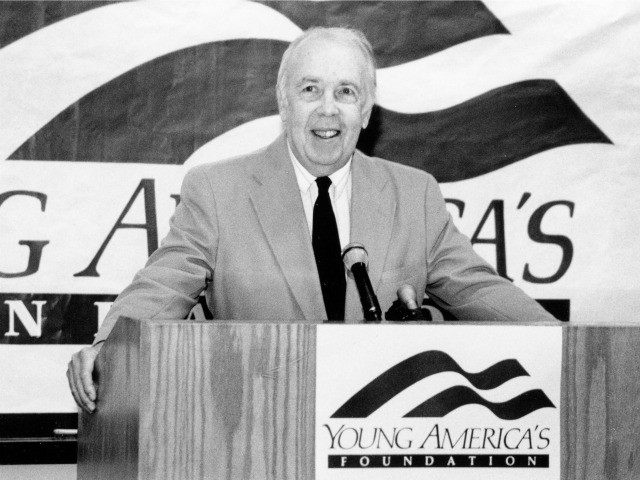Conservative founding father M. Stanton Evans was well known for his wit—he said he never liked anything about Nixon until Watergate. His funeral may have been his last witticism: a Protestant service, led by a Catholic priest, with a black Methodist choir rocking the otherwise staid Catholic Church.
Both the priest and the choir were mentioned in Evans’s will because he wanted them both for his funeral.
Evans had met Father Vince Rigdon years ago as a reporter covering the disturbances at Columbia University, and Rigdon was an undergraduate wanting to fight back against the radicalism of the day. They became lifelong friends.
As for the choir—Evans used to hear them through the window as he passed a black Methodist Church near his home.
M. Stanton Evans was eulogized Thursday afternoon in the presence of a who’s who of the old political right: the now gray, balding, and sometimes caned generation that knew Bill Buckley and Ronald Reagan as peers, along with a raft of younger, though not young, conservatives.
Richard Viguerie, Ed Meese, David Keene, Don Lambro (Washington Times), Tom Winter (Human Events), Al Regnery Jr., Morton Blackwell (Leadership Institute), Tom Pauken (former Reagan official), Terry Scanlon (Capital Research Center), Terry Jeffrey (CNS), Brent Bozell, Grover Norquist, Robert Royal, Kate O’Beirne, and many more came to see Evans off, a man described repeatedly as a Christian believer, just not a very good one.
Father Vince Rigdon, himself no slouch in this crowd, what with his name on the important Rigdon v. Perry Supreme Court decision, told a story in his sermon that summed up Evans’s dedication to teaching younger generations of conservatives.
Back in 1999, some students at St. Bonaventure College invited Evans to give a speech, one of thousands Evans gave in his life. As usual, he continued his lessons afterwards over beers and—like with Rigdon—went on to maintain lifelong contact with a student named Mario Calabrese who later became a Dominican priest.
In his final days, Calabrese baptized Evans who didn’t know if he’d ever received that sacrament before. Calabrese also administered the Last Rights of the Catholic Church, though Evans was not a Catholic.
“And that,” said Rigdon pointing dramatically to a stout young Dominican, “is Father Mario Calabrese sitting right there.”
Anyone who came of conservative age during the last half century will know the name of M. Stanton Evans. He taught more than a few generations of conservatives what it means to be a conservative and what it means to America for them to be conservative. He drafted one of the founding documents of the modern conservative movement, the so-called Sharon Statement that founded Young Americans for Freedom.
After graduating from Yale, he helped edit The Freeman, one of the first libertarian journals in America. He became head editorial writer of the Indianapolis News and, the following year, took over the editorship, becoming, at 26, the youngest editor of a metropolitan daily in the country.
He served as associate editor of National Review for thirteen years, and then managing editor of Human Events, contributing to it until the end of his life. He was also chairman of the American Conservative Union, and, for twenty-five years, he ran the National Journalism Center that taught Ann Coulter how to write.
A few hundred other great Americans accompanied M. Stan Evans on his final journey from a Catholic Church in Leesburg, Virginia, on Thursday afternoon, and all the while the black choir did their best to get the room up and clapping though this was not to be. A church full of ancient white conservatives urged on by a gospel beat: M. Stanton Evans’s last bon mot.

COMMENTS
Please let us know if you're having issues with commenting.